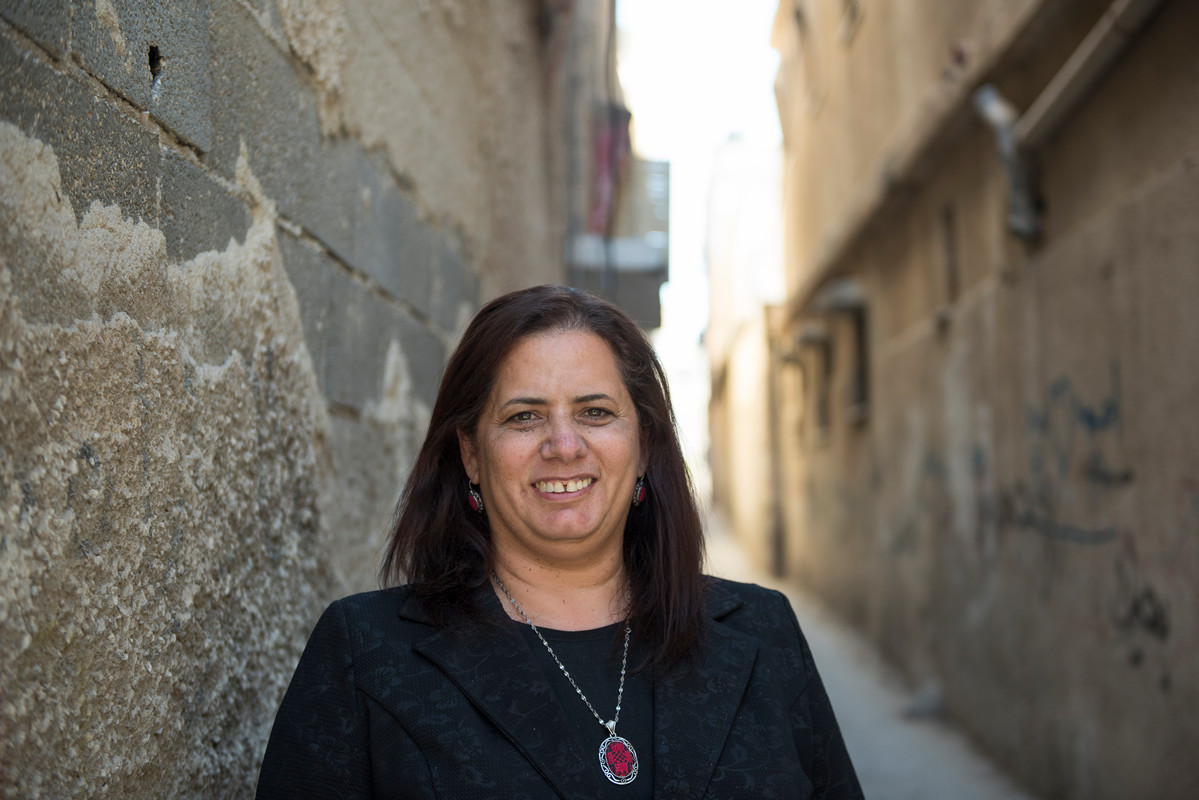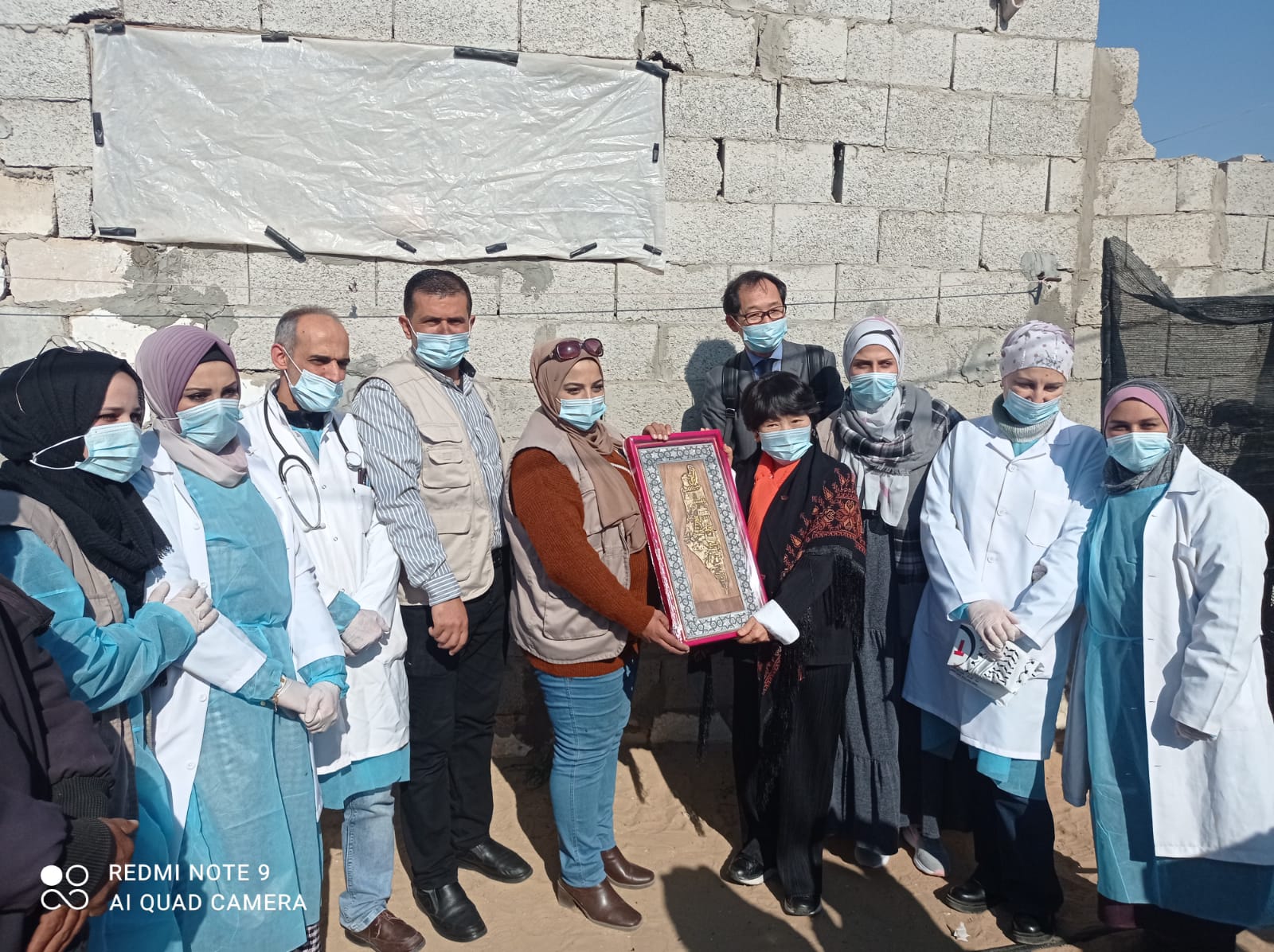It’s early in the morning, and Ammal Awadallah, the Executive Director of the Palestinian Family Planning and Protection Association (PFPPA) is on her way to the main office in Jerusalem. As with every morning, she checks in with her team who provide answers to the questions posed by clients across Palestine through the Association’s new sexual and reproductive health care mobile app.
“There are a lot of questions from youth, women in particular, about sexual and reproductive health and gynecological health,” said Ammal. “We’re really trying to promote the app to women by having them make their appointments through the app, and then they’ll get curious to see other information and increase their awareness about other information and services we offer.”
Established in Jerusalem in 1964, PFPPA is an independent, non-profit and non-governmental association. Last year on International Women’s Day on 8 March, thanks to a small grant from the IPPF Social Enterprise Hub, PFPPA launched its free mobile app to provide clients with information and access to services including sexual and reproductive health, gender-based violence and comprehensive sexuality education. The app is the first of its kind in Palestine and has been downloaded close to 2000 times over the past year - a number that Ammal hopes to see grow even more.
when
country
Palestine
region
Arab World
Related Member Association
Palestinian Family Planning and Protection Association (PFPPA)

The free app is the first of its kind in Palestine
PFPPAEnsuring care and confidentiality for young people
Many youth in Palestine are already using the app, and can attest to the benefits of receiving sexual and reproductive health care and counseling online.
Twenty-five-year-old Zaina, from Hebron, a Palestinian city in the southern West Bank, said:
“The PFPPA app is easy to use and provides a lot of information and services, especially information about youth and adolescents, which many of us might be embarrassed to ask about in person.”
Waed, 22, a volunteer with PFPPA, says she used the app for premarital counseling.
“I got answers to my questions quickly, and I benefited greatly from the app. I even downloaded it for my family and my fiancé’s family to take advantage of all of this valuable information,” she said.

I got answers to my questions quickly, and I benefited greatly from the app. I even downloaded it for my family and my fiancé’s family to take advantage of all of this valuable information.

A digital reflection of PFPPA’s service delivery points
Digital technology in the West Bank and Gaza has accelerated in recent years; 80% of all households had internet access in 2019, compared to only 52% in 2017. Still, there are a number of challenges in advancing digital equity in Palestine and poverty remains a major barrier to connectivity.
During the COVID-19 lockdowns, Ammal describes the challenges in ensuring women could get in contact with the PFPPA team to receive counseling, consultation and other services. At the time, the organization used social media to disseminate contact phone numbers of doctors, midwives, social workers, psychologists, and even lawyers. A free hotline was also established, and a social worker was taking calls and providing referrals to other partner associations.
Ammal describes the PFPPA app as a reflection of the association’s service delivery points: “If you walk into one of our service delivery points, the services provided there are also available through the app for free. This includes information from health workers, psychosocial workers, legal counsellors and the youth friendly service center. Service providers can also provide counseling and questions are responded to within 24-48 hours.”

Women's voices are essential when developing digital products or services
PFPPAInvolving women in digital development
Digital products, solutions and content are often generically designed for mostly male users, with women infrequently involved in development. But including women’s voices is essential when developing any digital products or services, or any digital development programmes, in order to promote digital literacy, ensure online safety and increase access.
Recognizing this, the PFPPA app has involved and championed women since its inception, including through a client needs analysis, market research and a youth-friendly and gender-sensitive marketing strategy. PFPPA staff also attended capacity-building training and workshops conducted by the IPPF Social Enterprise Hub in 2021.
Prior to serving as PFPPA’s Executive Director, Ammal was the Association’s finance and administrative director for 12 years. These technical skills are useful in driving forward innovative solutions within the app, including transforming it into a social enterprise that will eventually incorporate advertisements and sell products to help diversify income and expand its portfolio.
“We hope that the app will help us generate income for the association and become more financially sustainable, which is a problem that we’re always facing,” she said.

Moving sexual and reproductive health services online to create a safe space where women and youth are empowered to ask questions is an important step towards equality.

Palestinians face additional access barriers
As the world moved online in response to the COVID-19 pandemic, Palestinians also had to contend with another problem that limited their ability to reach people and provide them with sexual and reproductive health services. Decades of Israeli occupation of Palestine has resulted in a protracted humanitarian crisis, and the geographical restrictions for Palestinians, coupled with the political instability prevents people from visiting PFPPA’s service delivery points to seek services or information.
“In Palestine, those in the West Bank cannot come to Jerusalem and nobody [from outside] can go into Gaza,” explains Ammal. “There's also the Apartheid segregation wall, which isolates Palestinian communities.”
She adds that the app was specifically designed to bridge the gap between communities where the PFPPA does not have clinics or service delivery points.
“The app is a new approach in reaching people. Most of our work is in the central and southern region of Palestine, and we have a service delivery point in the Gaza Strip as well. But we can't reach there and nor can they reach us. So with this app, we can reach people and provide services to anywhere in the country.”
One of the health care workers responsible for the PFPPA Youth Programs is Mohammed Abu Areish.
“The vast majority of questions that we receive via the app are from women that are planning to use a family planning method for the first time,” he said. “The questions are usually related to their concerns of any changes to their bodies or side effects, especially as they had already heard many rumors and wanted to know if they were true or not.”
Mohammed and his colleagues also provide referrals to other resources or partner organizations, and he adds that the app is an important way to ensure privacy and confidentiality for clients.
“The app in my opinion is a great way for people to ask questions that they may not feel so comfortable asking face to face. A number of the questions that we receive are quite sensitive and I think that those contacting us are confident that we guarantee their anonymity, privacy and confidentiality.”
Youth in Palestine are encouraged and empowered in addressing SRHR issues, says Ammal. But, speaking about women's rights in general is still extremely challenging. Moving sexual and reproductive health services online to create a safe space where women and youth are empowered to ask questions is an important step towards equality.
“Little by little, it’s making a difference. For me, the app is successful as long as it’s reaching people that wouldn’t have otherwise been reached,” she said, adding: “I believe in leaving no one behind. This is really what the app is all about.”
2X MATCH to connect women and girls with the care they need, wherever they are. When you donate today, you'll support innovative programs, like our digital health technology helping women in Palestine overcome barriers to care by putting essential information and services directly in their hands.













